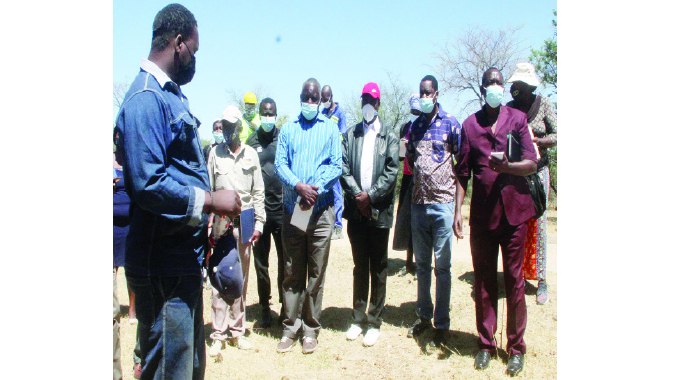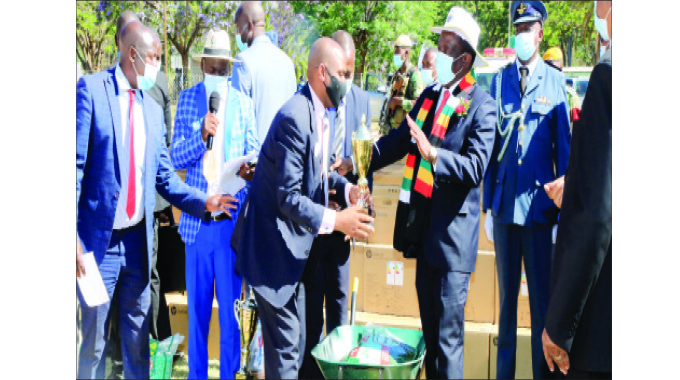DDF steps in to boost dam rehabilitation efforts

Sukulwenkosi Dube-Matutu, Chronicle Reporter
FAKANYE Dam which is in Silima Village, Mangwe District, is a major source of water for more than eight villages. The dam supplies the community with water for both domestic use and irrigation as they grow various vegetables in their nutrition gardens.
The dam is also a source of water for the villagers’ livestock.
The big challenge that the villagers now face is that the dam is heavily silted which means it can only hold a limited amount of water.
Villagers have also lost a number of livestock that get stuck in the mud hence the urgent need to remove the silt.
In a bid to address the problem, the villagers have mobilised their children and relatives in the diaspora to assist with resources to desilt the dam as well as repair the dam wall. Their efforts have however not yielded much as a lot of resources are required to desilt the dam and the dam also needs a new spillway.
Once the dam has been rehabilitated, villagers hope to establish irrigation schemes.
The District Development Fund (DDF) which has been impressed by the communities’ commitment to rehabilitate the dam, has since moved in.
DDF Permanent Secretary, Mr Christopher Shumba on Tuesday visited the dam as part of his tour to assess infrastructure development projects in Matabeleland South province. He assured villagers that Government will treat rehabilitation and repair of the dam as a matter of urgency. Mr Shumba said DDF will immediately assist the community with cement, manpower and other resources to expedite the rehabilitation works.
Ms Sinikiwe Dube said during poor rainy seasons, the dam dries up early leaving them with no source of water for both domestic use and irrrigation.
“This dam is a very important source of water for both domestic use and irrigation hence we have been trying to mobilise resources to desilt it. The same dam provides water for watering our livestock,” she said.
Another villager, Mr Silas Nkomo said they had been trying their best to repair the dam but had limited resources.
“We managed to mobilise each other to carry stones to the dam to repair the dam wall and tried to use buckets to scoop the sand,” he said.
Mr Nkomo said villagers lost a number of livestock that got stuck in the mud because the dam is now heavily silted.
The area’s councillor, Mr Bernard Tshuma said the communities have been battling to desilt the dam for the past six years.
He said last year they tried to repair the dam wall but it burst again following the incessant rains received last season.
Clr Tshuma said once the dam is desilted and its wall repaired, it could hold more water to support the communities’ irrigation projects as well as guarantee water for domestic use and for livestock.
“Last year the villagers and their relatives in the diaspora each contributed R400 towards repairing the dam wall. It was just a temporary solution because as the rains started it burst again because the dam doesn’t have a spillway and is heavily silted. We need a permanent solution which will involve desilting the dam, construction of a new spillway and repair of the dam wall,” he said.
Meanwhile, Mr Shumba said Government through DDF was working towards ensuring equitable distribution of infrastructure in all provinces across the country.
He said projects such as rehabilitation of Fakanye Dam need urgent attention. Mr Shumba said they will engage Government in order to get funding for the project.
He said he was conducting a tour of various infrastructure development projects under the DDF portfolio in different provinces across the country. Mr Shumba said under this new thrust, Government wants to ensure that all communities have water infrastructure, good roads and bridges.
He said infrastructure development was a key driver of economic growth to enable the country to realise its Vision 2030.
Mr Shumba said they will compile a report on findings of the assessment which will be used to lobby for funds to develop infrastructure.
On Monday Mr Shumba visited Gwanda and Umzingwane districts where he inspected roads which are being rehabilitated under the Emergency Road Rehabilitation Programme (ERRP). He also visited Chief Mabhena’s homestead in Umzingwane District where a borehole was being drilled. The borehole is set to bring relief to the surrounding community.
On Tuesday he visited Macingwane- Empandeni Road and Silima- Empandeni Road in Mangwe District which is being rehabilitated under the ERRP programme.
He said no part of the country will be left out under infrastructure development as remote parts which in the past were left out, were being prioritised.

Cattle in the mud at Macingwane Dam
“The objective of my tour is to see if there is equitable infrastructure development not only in Matabeleland South province but the entire country. This is inline with Vision 2030 as espoused by His Excellency President Mnangagwa,” he said.
Mr Shumba said after visiting all the eight rural provinces, he now has a fair understanding of challenges facing each province.
“We want to ensure that each community is linked to the country in terms of marketing their produce, visiting clinics and access to various services. We don’t want people to suffer because they stay in an area which does not have bridges or roads. We will make sure that each community is accessible and that there is adequate infrastructure,” he said.
Mr Shumba said councils should complement Government efforts to improve infrastructure in their respective areas.–@DubeMatutu











Comments